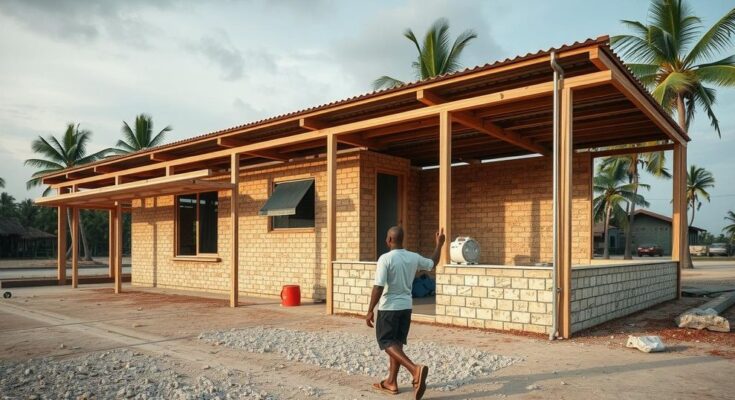Mozambique has initiated shelter construction for Cyclone Chido victims after the storm caused 70 fatalities and injured 600. Trade and Industry Minister Silvino Moreno highlighted the importance of using resilient materials. With an estimated 174,000 people affected, UNICEF is mobilizing resources to assist communities, particularly as the region faces a cholera outbreak amidst infrastructural damages.
Mozambique has commenced the construction of shelters for the victims of Cyclone Chido, which devastated several northern regions of the country earlier this week. The cyclone, which struck on Sunday, claimed the lives of at least 70 individuals and injured around 600, leaving widespread destruction in its path. During a visit to the affected areas, the Minister of Trade and Industry, Mr. Silvino Moreno, emphasized the government’s commitment to providing aid and highlighted the crucial role of international partners in these efforts.
In his address to the media following his tour of Nampula, one of the regions severely impacted by the cyclone, Mr. Moreno stated that the immediate priority is to construct shelters using resilient materials. He noted that the goal is to prevent the same level of devastation that occurred with homes primarily built from mud and reeds, which were unable to withstand the cyclone’s force. Furthermore, Mr. Moreno pointed out the necessity for improved construction training for local builders.
Prior to striking Mozambique, Cyclone Chido wreaked havoc in Mayotte, a French archipelago, resulting in significant fatalities, infrastructure damage, and heightened vulnerabilities for communities, including asylum seekers and refugees, as reported by humanitarian organizations. The storm also impacted southern Malawi, where strong winds and rains resulted in damage to homes and infrastructure.
Mozambique’s meteorology agency has warned of the potential for additional storms over the next three months during the rainy season, urging authorities and communities to enhance their preparedness. UNICEF has reported that approximately 174,000 individuals have been affected by the cyclone’s impact, with figures likely to rise as assessments continue. The cyclone also damaged numerous classrooms and struck at least 20 health facilities.
Michael Chimedza, UNICEF’s field office head in Zambezia province, indicated that his organization has prepared resources to assist 50,000 individuals and has allocated funds for local response training. In addition to Nampula, the cyclone impacted Cabo Delgado and Niassa provinces, leaving over 25,000 families without electricity and damaging essential infrastructure, including healthcare facilities, roads, and water supply sources.
The compounded effects of the cyclone pose additional challenges in a region already grappling with a cholera outbreak, raising concerns among aid agencies about the potential for a public health crisis.
Cyclone Chido has significantly affected Mozambique, leading to extensive destruction and loss of life. It serves as a reminder of the increasing frequency and intensity of such natural disasters in the region, particularly in light of climate change. The devastation reported post-cyclone reveals the vulnerability of many communities in Mozambique, which primarily rely on inadequate housing constructions, making them susceptible to weather-related damages. The government’s response, driven by support from international agencies like UNICEF, aims to provide immediate relief and enhance long-term resilience among affected populations.
In summary, Mozambique’s government has begun to erect shelters for victims of Cyclone Chido following a catastrophic event that resulted in numerous fatalities and extensive property damage. The focus on resilient construction materials and improved training for builders is a proactive step towards safeguarding communities from future disasters. Collaborative efforts with international partners and humanitarian agencies are crucial for effective recovery and enhancing the resilience of the affected population against ongoing and future storm threats.
Original Source: www.voanews.com




